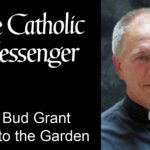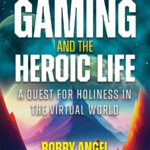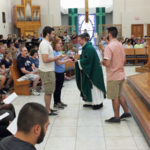A scene in the docudrama “The Sultan and the Saint” depicts Muslim troops delivering loaves of flatbread to hungry Christian crusaders sloshing helplessly in the flooded fields of Damietta, Egypt, during the fifth crusade. Hatred and enmity gave way to recognition of shared humanity: a hunger that must be satisfied. Eight centuries later, it is time for Christians and Muslims to revisit their shared humanity and faith in God.
Just last month, we published a Catholic News Service article about an updated survey that examined U.S. Catholics’ views of Muslims. The results should dismay all of us. Three in 10 Catholics admit to having unfavorable views about Muslims. Catholics are less likely than other Americans in the general public to know a Muslim personally, and 50 percent of Catholics can’t name any similarities between Catholicism and Islam. Many don’t know that Catholics and Muslims share the same God. Both religions revere the Virgin Mary as the mother of Jesus.
Both religions embrace peace.
Ignorance about Islam seems startling given the welcoming, confident example that Pope Francis sets in his interaction with Muslims. Remember, the Holy Father washed the feet of Muslim inmates on Holy Thursday early in his pontificate; he provided shelter to refugees, including Muslims, and embraced an imam during his papal visit to Egypt last month. Pope Francis underscores the message that radical Islam, and the terrorists who apply it, do not speak for the religion of Islam. The terrorists represent an aberration.
But Catholics, apparently, remain wary. Recognizing the need for interreligious dialogue, the Sisters of St. Francis of Clinton financially supported production of “The Sultan and the Saint” (which premiered April 23 in Davenport). The docudrama tells the 13th century story of two courageous men of faith, St. Francis of Assisi and Sultan Malek Al-Kamil, engaged in interreligious dialogue in the midst of war between Christians and Muslims. The encounter of the Sultan and the Franciscan monk didn’t stop the crusades or end violence, but it impacted each man profoundly in their efforts to promote peace and respect in the world in which they lived.
“The Franciscans maintain a unique position as the custodians of the Holy Places in the Holy Land. I think this is attributable to the interaction of St. Francis and Sultan Malek Al-Kamil,” observes Kent Ferris, director of the diocesan Social Action Office and a secular Franciscan. “The encounter continues to shape our commitment to peace and nonviolence.”
Let’s broaden those efforts. For starters, learn about Islam. “People need to take it upon themselves to go above and beyond equipping themselves with knowledge,” says Dan Tutt of UPF TV, which created “The Sultan and the Saint.” Tutt recommends:
• UPF TV films that his company creates to counter bigotry and create peace through the media. “The Sultan and the Saint” will be released as a DVD later this year. Visit the website www.upf.tv.
• Shahab Ahmed’s book “What is Islam? The Importance of Being Islamic.”
• Karen Armstrong, who wrote “Muhammad: A Prophet for Our Time,” among other books.
The Messenger recommends:
• “Nostra Aetate” (“Declaration on the Relation of the Church to Non-Christian Religions”)
• U.S. Conference of Catholic Bishops’ “Resources on Islam and Muslims” (http://tinyurl.com/lbs94h5).
• “Daring to Cross the Threshold — Francis of Assisi Encounters Sultan Al-Kamil” by Sister Kathleen Warren, a Sister of St. Francis of Rochester, Minn. She served as a consultant for the docudrama.
Sr. Warren’s book offers good advice about the Catholic Church and dialogue. She identifies three main points:
• Conversion — a willingness to change attitudes, behaviors, and even long-held beliefs.
• Respectful dialogue — rooted in fraternal charity, profound humility and love for the truth.
• Communion-unity — restoration of unity among peoples of Christian and non-Christian faiths.
Among the supporters and viewers of the Davenport premiere of “The Sultan and the Saint” was Lisa Zaynab Killinger, president of the Bettendorf-based Muslim Community of the Quad Cities. For her, the most pivotal moment was the flatbread scene. “This act of interfaith kindness and ‘loving thine enemy’ demonstrated the true Islamic value of showing mercy and feeding the hungry, even if they have been your enemy in the past.”
She notes that breaking bread together is a practice common to both Christians and Muslims, and offers an invitation that we can accept with gratitude. “Our local Muslim Community would like to invite people of all faiths (and those of no particular faith) to break bread with the Muslims in a simple flatbread and hummus meal at the Bettendorf Mosque. After dinner, we will watch the movie, “The Sultan and the Saint” followed by a brief discussion and commitment to interfaith cooperation and peacemaking.”
Watch this page for details.
Barb Arland-Fye, Editor (arland-fye@davenportdiocese.org)











